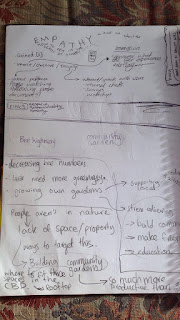Interview with Massey councillor
We came up with the following questions to get an insight from a professional (Vant Russell, Massey university counselor) about stress in the city:
"In the reading 'Stress and the city' by Ellard he stats "rates of mental illness tend to be higher in busy urban centers than they are in the countryside" why do you think this is?"
What we know is that excessive stress is a key factor in promoting or precipitating a range of common mental health concerns. If Ellard is correct, we could readily conclude that life in busy urban areas must be more stressful than life in the countryside. While this seems like a reasonable proposition, it is worth noting that life in the countryside does not necessarily take the form of a relaxed, bucolic ideal – rosy-cheeked children skipping merrily along garden paths and apple pie cooling on the windowsill. Life in the countryside comes with its own stressors. Are they less significant or more manageable than those associated with city living? Perhaps. And does contact with the natural landscape or the sense of community which may exist in the countryside act as protective factors against mental health concerns? Sounds plausible.
"Do you find that a lot of people's stress stems from spending too much time focusing on assignments/ being inside and not getting outdoors?"
I think that this is a part of the equation. We know that getting outdoors, being active, having fun, engaging with others, practicing mindfulness, gaining perspective with a change of scene… all of these things can help to regulate stress. When engaged with regularly, these activities can help to cultivate a solid foundation of wellbeing. When these activities are not prioritised that foundation of wellbeing may become unstable. When this occurs, not only are people more likely to accumulate unhealthy levels of stress, they are also likely to be less efficient or productive in relation to their academic work… which only serves to compound that stress.
"What are some strategies you suggest for dealing with stress and low mood, especially related to living in a big city?"
The Mental Health Foundation of New Zealand recommends these Five Ways to Wellbeing:
1. Connect – with family and friends, with colleagues and neighbours, with your local community – building these connections will support and enrich you every day.
2. Give – do something nice for a friend or a stranger, volunteer your time, join a community group – our wellbeing is linked to our wider community.
3. Take notice – practice mindfulness, be curious, attend to and appreciate the little things, notice the changing seasons – our life is made up of those things we notice.
4. Keep learning – try something new, sign up for that course, learn to play an instrument – challenge and achievement develops confidence and mastery.
5. Be active – exercise regularly, join a gym, take a walk, join a hiking group, practice yoga – regular physical activity is crucial for physical and mental wellbeing.
"Do you think living in an apartment has an effect on your health. If yes, what?"
It may be all too easy to conclude that living in an apartment would have a negative impact on one’s health. We could wax lyrical about the evolution of Homo sapiens over the past couple of hundred thousand years, reflecting upon the way we, as a species, are most familiar and comfortable with wide-open spaces and intimate connection with the natural environment. While there may be elements of truth to this notion, I do not think we can conclude that apartment living must necessarily have a negative impact on one’s health. What we need is for our living space to be warm and comfortable, adequately aired, safe and secure and, perhaps, to provide us with a sense of home or belonging. If we know our neighbours and feel a sense of community, so much the better. It strikes me that this can be achieved as readily (and perhaps in some cases more readily) for those who live in apartments as for those inhabiting other forms of accommodation. After that, health and wellbeing will be based upon individual factors and upon engagement with the kinds of wellbeing activities mentioned above.
"Do you think having more parks/gardens in big cities would improve peoples mental and physical health?"
While I do not believe that more parks or green spaces in large urban areas would necessarily improve the mental and physical health of a population in and of themselves, I do think that an absence of such spaces could well have a detrimental impact on the mental and physical health of the population. What parks and green spaces represent is a potential – a space within which people may choose to engage in a plethora of wellbeing-related activities. The more such spaces there are, the more possibility people have to engage. If people choose not to engage with such spaces the positive health outcomes are likely to be minimal or non-existent.

Comments
Post a Comment